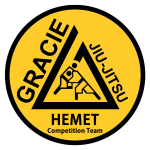Call Us Today! (951) 603-4202 | info@mygraciehemet.com
Enemies of the Mat: The Plateau Effect in Jiu-Jitsu
For many jiu-jitsu practitioners, the plateau effect is an inevitable and challenging part of the journey, bringing frustration and even doubts about continuing the sport. The feeling of “staying in one place” can undermine confidence and motivation, impacting not only physical performance but also mental health. The good news is that the plateau effect can be understood, faced, and overcome. In this article, we’ll delve deeper into this phenomenon, exploring its causes, effects, and the best strategies to break through this barrier.

What Is the Plateau Effect?
The plateau effect occurs when progress in a skill or training begins to slow or, in some cases, seems to stop altogether. In jiu-jitsu, it can manifest in various ways, such as feeling like your techniques aren’t improving, struggling to apply what you’ve learned in training or competitions, or even plateauing in physical conditioning. This effect is common and is a natural part of any long-term physical or mental practice, as both body and mind tend to adapt to constant training.
Causes of the Plateau Effect in Jiu-Jitsu
Excessive Repetition and Lack of Challenges
Repeating the same movements and drills is essential for technique but can also create a comfort zone. This pattern blocks growth, as the brain needs new stimuli to create the connections that sustain learning. A monotonous routine stops being challenging and leads to a state of stagnation.Overtraining and Lack of Proper Rest
In jiu-jitsu, the desire to improve often drives practitioners to push beyond their limits without adequate breaks. Overtraining causes physical and mental fatigue, straining muscles, tendons, and even the central nervous system. This impairs reaction time, reduces the capacity to learn new techniques, and increases the risk of injury.Rushing the Learning Process
A common mistake in jiu-jitsu is rushing to master multiple techniques without truly understanding each movement. This overload of shallow knowledge leads to a feeling that learning is not solid, making it difficult to apply skills effectively during sparring. This type of plateau is mental and happens when there isn’t a deep understanding of the techniques you’re trying to master.Negative Self-Evaluation and Comparison with Others
As a student progresses, it’s natural to observe and compare themselves to others. However, when comparison turns negative, focusing on one’s limitations, mental and emotional plateaus emerge. Harsh self-criticism, often baseless, erodes confidence and stalls progress.Psychological Pressure and Fear of Failure
In jiu-jitsu, the fear of making mistakes can lead practitioners to avoid trying new or complex techniques, naturally limiting growth. This kind of psychological pressure blocks the freedom to test, take risks, and learn from mistakes.
Consequences of the Plateau Effect
The plateau phase can have various consequences beyond mere stagnation in technical development:
- Decrease in Motivation: The feeling that training is no longer enjoyable or challenging can lead to a loss of interest in jiu-jitsu.
- Lower Self-Confidence: Stagnation may make the practitioner doubt their abilities, devaluing their accomplishments.
- Higher Risk of Injury: By attempting to “force” progress, many students end up overextending themselves, increasing the likelihood of injury.
Strategies to Overcome the Plateau Effect
Switch Up Your Training Style and Try New Approaches
Incorporating new techniques, adjusting your fight style, and working on weaker areas can reignite interest and progress. Try hifting your focus, like moving from a defensive approach to a more offensive one.Set Performance-Based Goals, Not Just Outcome Goals
Rather than focusing only on competitive goals or belt ranks, create goals tied to performance, such as executing a technique smoothly or improving endurance in long sparring sessions. These goals are more controllable and make it easier to perceive progress.Plan Rest and Include Active Recovery Periods
Rest is an integral part of progress. During recovery periods, the body and brain consolidate learning, turning temporary information into long-term memory. Practices such as stretching, massage, and even meditation accelerate both mental and physical recovery.Understand and Respect the Cycles of Progression
Accepting that jiu-jitsu involves ups and downs is essential for maintaining motivation and patience. In many cases, a plateau is just an adaptation phase where the body and mind prepare for the next growth stage.Seek Support and Feedback from Instructors and Peers
Feedback is one of the most important tools for correcting and improving training. Ask instructors or more experienced peers for an honest assessment of your strengths and areas for improvement. This external perspective can help you overcome self-imposed limitations and create a clearer path for growth.
Conclusion
Overcoming the plateau effect is a key part of the jiu-jitsu journey and helps practitioners develop more than just technique, fostering patience, resilience, and adaptability. Adopting a strategic approach, respecting the process, and understanding that growth is not always linear are essential steps to defeating this enemy of the mat. In the end, the plateau becomes an opportunity for self-discovery and a signal that growth is just around the corner.
Sources
- Ricci, A. Overcoming Plateaus in Martial Arts Training. Martial Arts Insight, 2022.
- Smith, J. Recovery and Progression in BJJ Training. BJJ Knowledge Hub, 2021.
- Kimura, R. The Psychology of Learning in Martial Arts. Combat Psychology Journal, 2020.
- Gordon, B. Jiu-Jitsu and the Journey of Self-Improvement. Ground Game Press, 2019.

